One of the greatest pleasures for hummingbird lovers is seeing the birds roaming around their feeders. However, this image can be ruined by something as tiny as an ant. Ants can take over an entire feeder and drive your beloved birds away.
Do you have ants in your hummingbird feeder? Are you wondering how to avoid having ants in your hummingbird feeder? Here are some bulletproof ways to keep these tiny pests away from your hummingbird feeder.
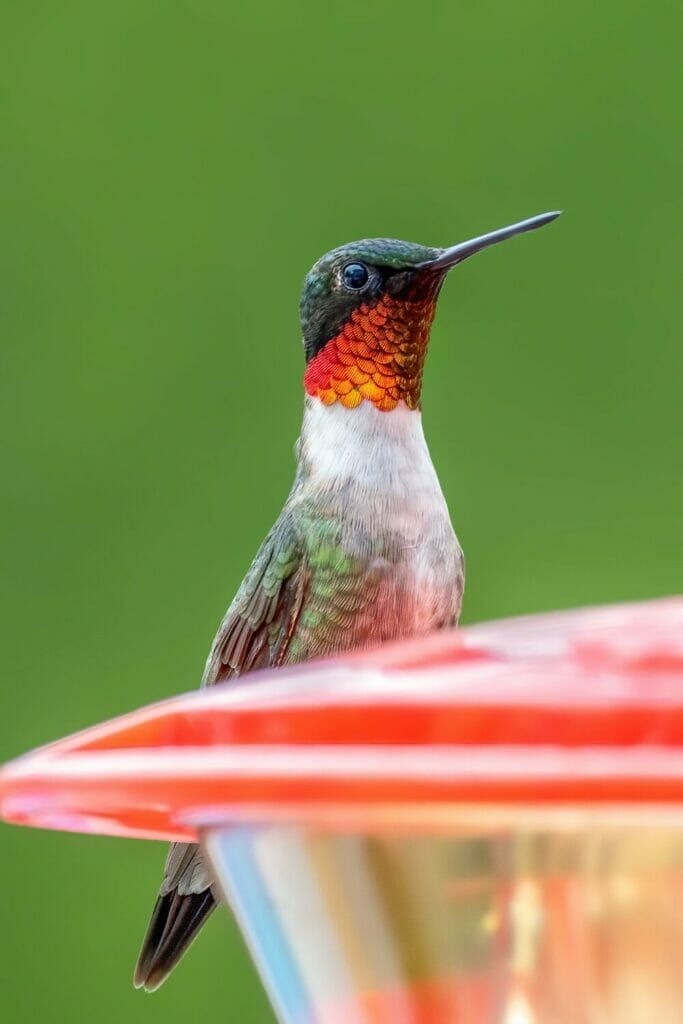
Tips on How to Keep Ants Away from a Hummingbird Feeder
1. Use a Fishing Line to Hang the Hummingbird Feeder
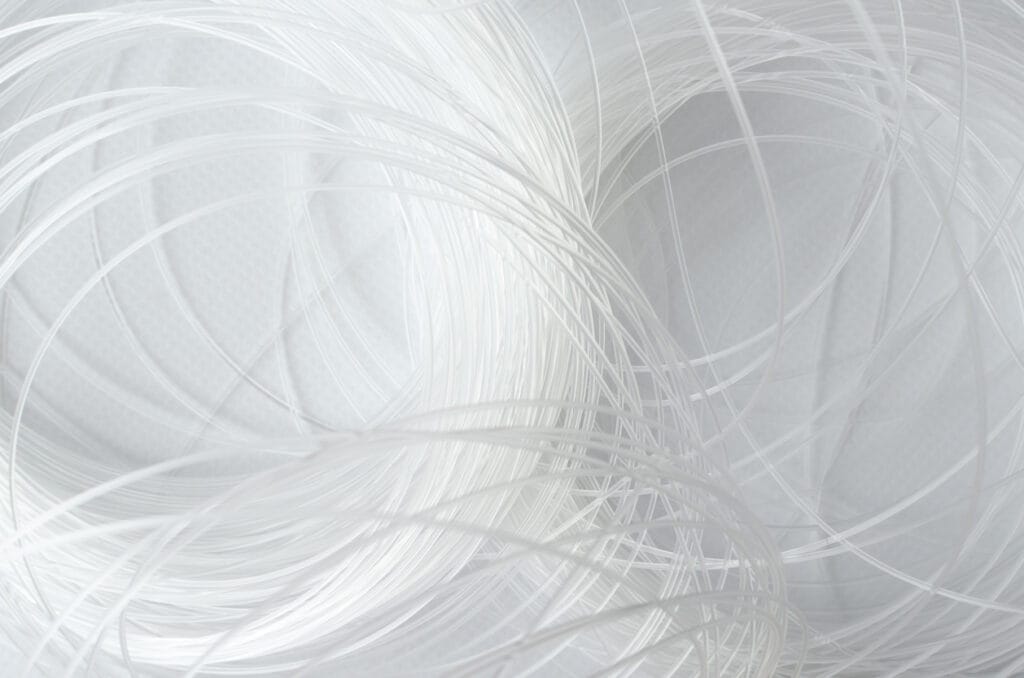
Fishing lines are very thin and slippery, even for ants. Hanging your hummingbird feeder from such a thin line can prevent ants from climbing into it; it’s like walking on a tightrope.
However, you should pick a fishing line that can support the weight of the feeder and the birds on it. The last thing you need is for your feeder to fall off, which may harm your hummingbirds.
Top Tip: Make sure to get a fishing line that is strong enough to carry at least two pounds and long enough to cover the entire height from which you hang your feeder.
2. Hang Your Hummingbird Feeder Over Water
Ants can’t swim. If the feeder hangs on a fishing line and above water, ants can’t reach it from any side.
Look for a body of water, like a pond or a fountain, to hang your hummingbird feeder above. If not, a birdbath will do.
A birdbath can be a brilliant idea because it won’t only repel ants but also attract hummingbirds.
3. Place your Hummingbird Feeder in the Shade
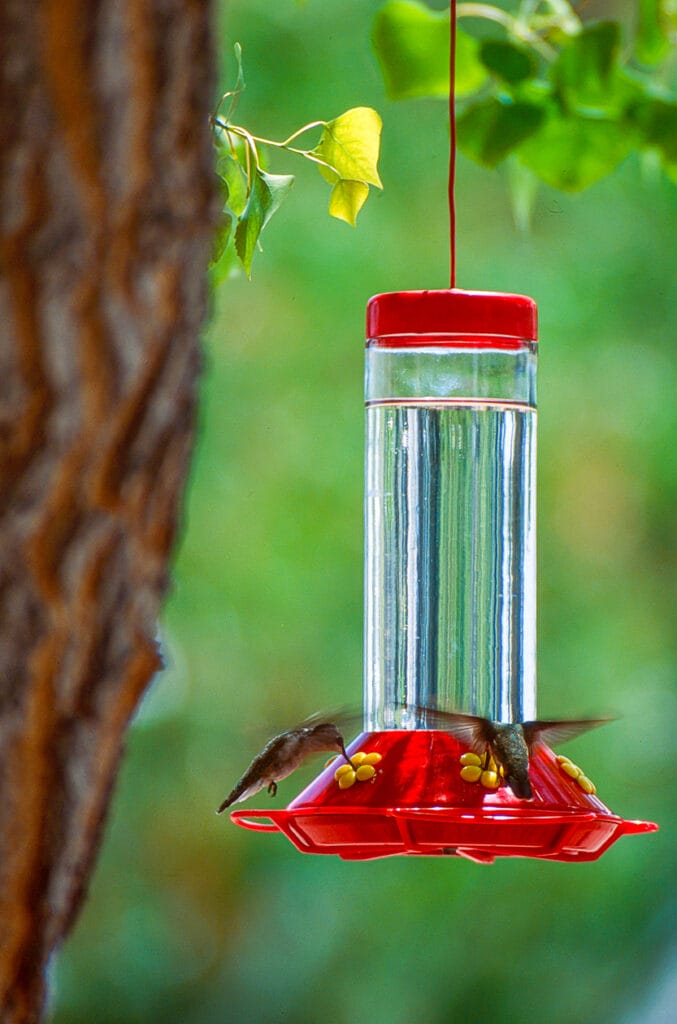
Find a spot that’s partially shaded. A shaded area would be too dark for the hummingbirds to locate your feeder.
On the other hand, too much sunlight can heat the nectar, making it unappealing to the birds. Moreover, the heat from direct sunlight would expand the plastic of the feeder, resulting in cracks and leaks that attract ants.
If you’re not sure about a certain spot, consider its visibility. If more than half of the hummingbird feeder is visible from all sides, this is the spot for you.
4. Keep Your Hummingbird Feeder on the Move
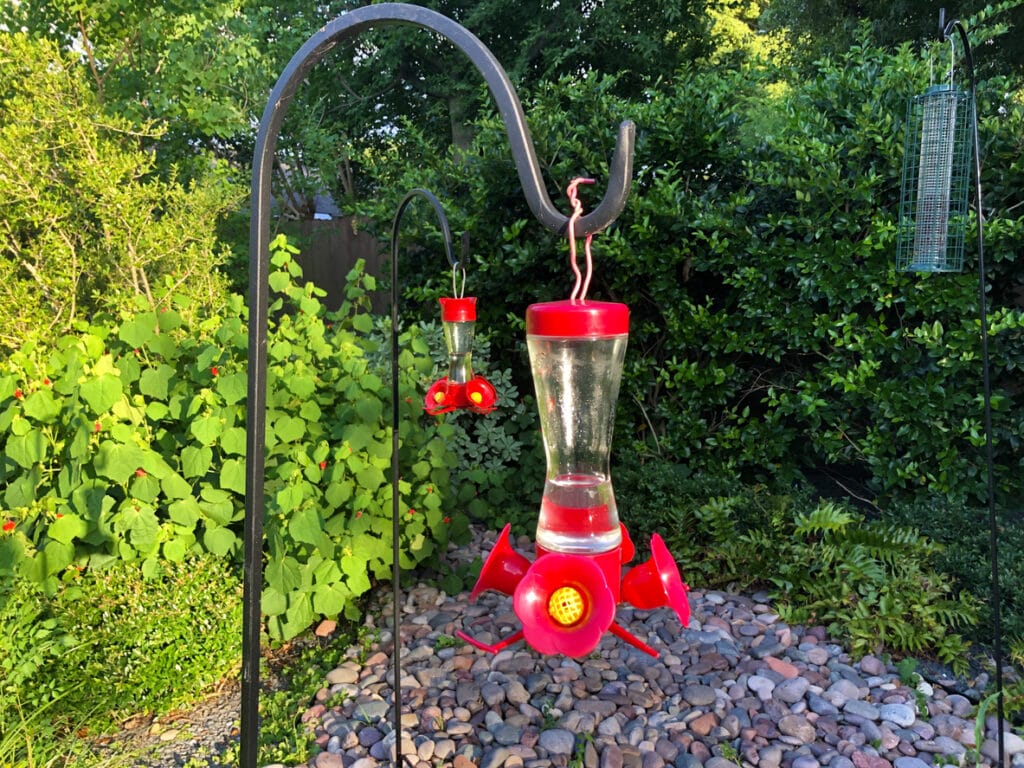
If you move your feeder regularly, you avoid a total ant invasion. Relocate the feeder to eliminate the trail ants leave behind for the rest of their colony to follow.
Top Tip: You don’t need to worry about losing the birds. Hummingbirds are highly adaptable and will find the feeder anywhere you place it.
If you put out more than one feeder, make sure to place them at least seven feet apart. You can place your hummingbird feeder anywhere near small trees, which can be safe for the birds.
However, don’t put feeders near other birdhouses. The whole aim is to give hummingbirds a safe and friendly feeding environment.
5. Use an Ant Moat
An ant moat is a simple but effective way to keep ants away from your feeder. Ant moats are small containers filled with water and hanging above the hummingbird feeder to prevent the ants from reaching the nectar inside it.
However, the water in ant moats dries out fast, especially in the summer, so make sure it’s always full.
6. Install an Ant Guard

An ant guard can be your best option if ants can maneuver around the ant moat.
It contains Permethrin, a light insecticide that doesn’t kill ants but just drives them away. Permethrin doesn’t pose any threat to birds, humans, or pets.
7. Repair Leaks
Always make sure that your hummingbird feeder has no cracks or leaks. Any sugar water leakage would attract ants to your feeder.
Author Note: Be extra cautious during the summer because the heat can cause the expansion and cracking of feeders. Choose a spot that is not exposed to direct sunlight for your hummingbird feeder.
That doesn’t mean that you should skip maintenance in winter. Wind may cause the feeder to hit a tree or even fall off, which may also cause cracks.
You should regularly check your feeder in order to patch up leaks, tighten any loose parts, or even replace the feeder altogether when necessary.
8. Keep Your Hummingbird Feeder Clean
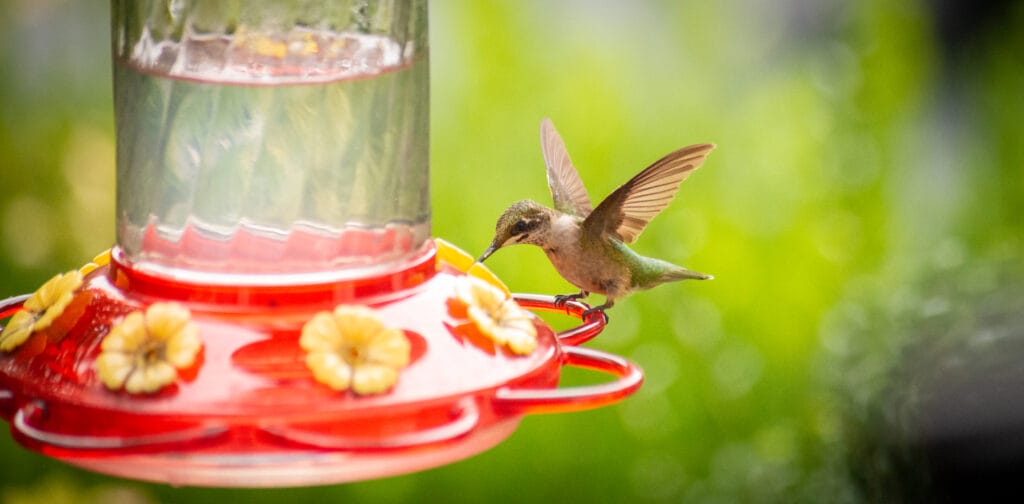
Keeping ants away from your hummingbird feeder isn’t much different from keeping them away from your home or any other space. Simply wipe away any sticky mess left behind.
Clean your hummingbird feeder regularly to prevent ants. Wipe it inside and out, and clean the ant moat and ant guard as well. It’s a good idea to choose a hummingbird feeder that is easy to clean.
9. Use Safe Ingredients from Your Home
Use nature to repel ants. There are a number of natural items in your household that can drive ants away.
Among major ant repellents are mint and bay leaves. Ants detest the smell of mint and bay leaves. Use this to your advantage.
You can put some mint or bay right inside the feeder. If there’s no space, simply tie some leaves to the pole from which the feeder is hanging or rub the outside of the feeder with the leaves. Perhaps the best technique is to plant mint at the same spot where your hummingbird feeder is hanging.
Moreover, ants can’t stand lemon juice, vinegar, cayenne pepper, and peppermint essential oil. You can simply spray any one or a combination of these items around the feeder to keep ants away.
Author Note: These natural items won’t harm ants – and certainly not the hummingbirds. They’ll only keep the ants away from where they aren’t welcomed.
10. Use Insecticide Sprays
You may try to use insecticides to keep ants as well as other insects away. However, remember that they aren’t safe for the birds either, so be cautious.
Simply spray the outer-bottom part of the feeder, the ground under it, as well as the pole or tree from which it hangs with insecticides.
This way is effective but aggressive. It may kill ants rather than just repel them. If you choose to do it, try to keep the insecticide as low to the ground as possible to avoid harming the birds.
11. Make Them Stick
Ants would most probably stay away from places where they might get stuck. However, how to do that without harming the hummingbirds themselves?
Author Note: The easiest way is to use adhesive tape around the pole from which the feeder is hanging. You need to make sure that the gummy side is exposed to the ants. This way, ants won’t reach the feeder.
12. Make the Surface Slippery
Ants avoid walking on slippery surfaces. You can make use of that by using sticky substances such as Vaseline, Vicks, or VapoRub. In addition to the stickiness, ants hate the smell of such items.
Another way to make the area slippery is to use a slippery material, such as vegetable oil or petroleum jelly. Simply apply them to the pole or the bottom of the feeder.
However, no matter what substance you choose, make sure to use it only on the parts of the feeder that hummingbirds don’t touch. If a bird touches any of these oily substances, its wings may stick, preventing it from flying. Remember, the point is to deter the ants, not the hummingbirds.
Plus, you should be extra cautious during the summer because these materials would require constant replacement and cleaning.
Why Do Hummingbird Feeders Attract Ants?

To answer this question, you need to know first what hummingbirds eat. They feed on nectar, which is sugar and water. So, it’s easy to conclude that ants are attracted to the content of the feeder.
Ants recognize the presence of nectar as it leaks out from a cracked bird feeder. Unfortunately, most feeders show cracks, especially in the summer, due to their exposure to heat. But no need to worry! There are ways to keep ants away from your hummingbird feeder.
Do Ants Harm Hummingbirds?
Ants can’t typically harm or kill a hummingbird. However, there are some venomous species of ants. If one bites a hummingbird, it can kill it.
Moreover, you can’t guarantee that your feeder attracts only healthy hummingbirds. A swarm of ants may harm or even kill an injured or sick bird.
On the other hand, ants may die or decay in the nectar. That’s not the healthiest thing to offer your beloved hummingbirds. At least, it might change the taste or color of the nectar, making it unappealing to hummingbirds.
Therefore, by all means, you need to keep ants away from your hummingbird feeders.
In Conclusion
Ants are particularly attracted to hummingbird feeders because of their content. Hummingbird feeders sometimes leak sugary water, which is a major attraction to ants.
Worried about what to do if you have ants in your hummingbird feeder? Fortunately, there are several different ways to keep ants away from your hummingbird feeder.
The positioning of the feeder is important. Hanging your hummingbird feeder on a fishing line above water and away from direct sunlight is a start.
No matter how you do it, your hummingbirds deserve a clean, safe feeding environment.
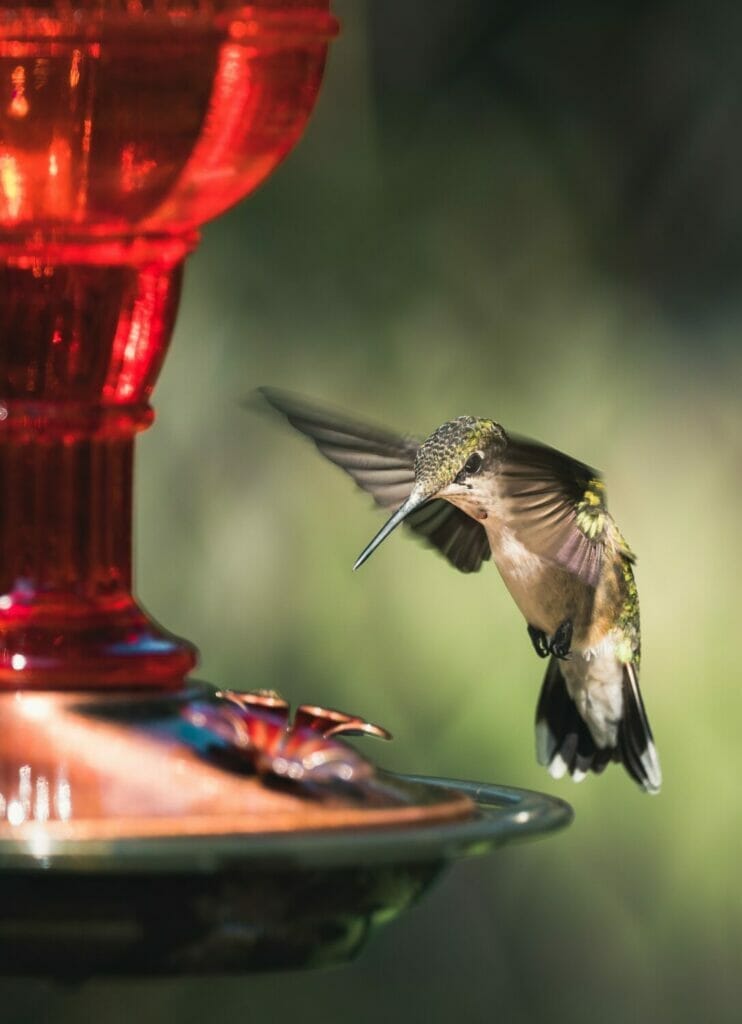
FAQ
To keep ants out of hummingbird feeders, you can try several methods including, hanging the feeder with a long cord so that the ant trail cannot reach it. Placing the feeder on a pole that is surrounded by a moat filled with water. You can also try applying petroleum jelly or tanglefoot around the feeding ports and the top rim of the hummingbird feeder. Lastly, try using ant traps or bait stations near the feeder.
Ants are attracted to hummingbird feeders because the sweet nectar solution inside the feeder provides a source of food. Ants are attracted to sugary substances, and the nectar solution can be a prime target for them.
Ants in a hummingbird feeder can be a nuisance, but they usually do not hurt the hummingbirds. However, ants can compete with the hummingbirds for the nectar, and their presence may discourage the hummingbirds from visiting the feeder.
Yes, petroleum jelly, such as Vaseline, can be effective in keeping ants away from hummingbird feeders. Ants have difficulty crawling over the jelly, so it creates a barrier that prevents them from reaching the feeder.
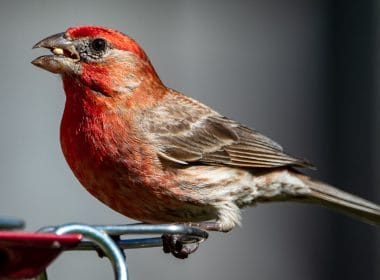

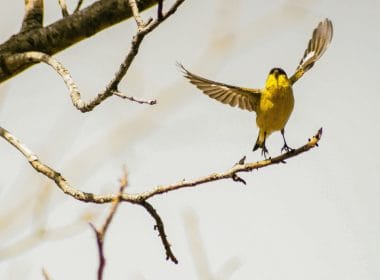

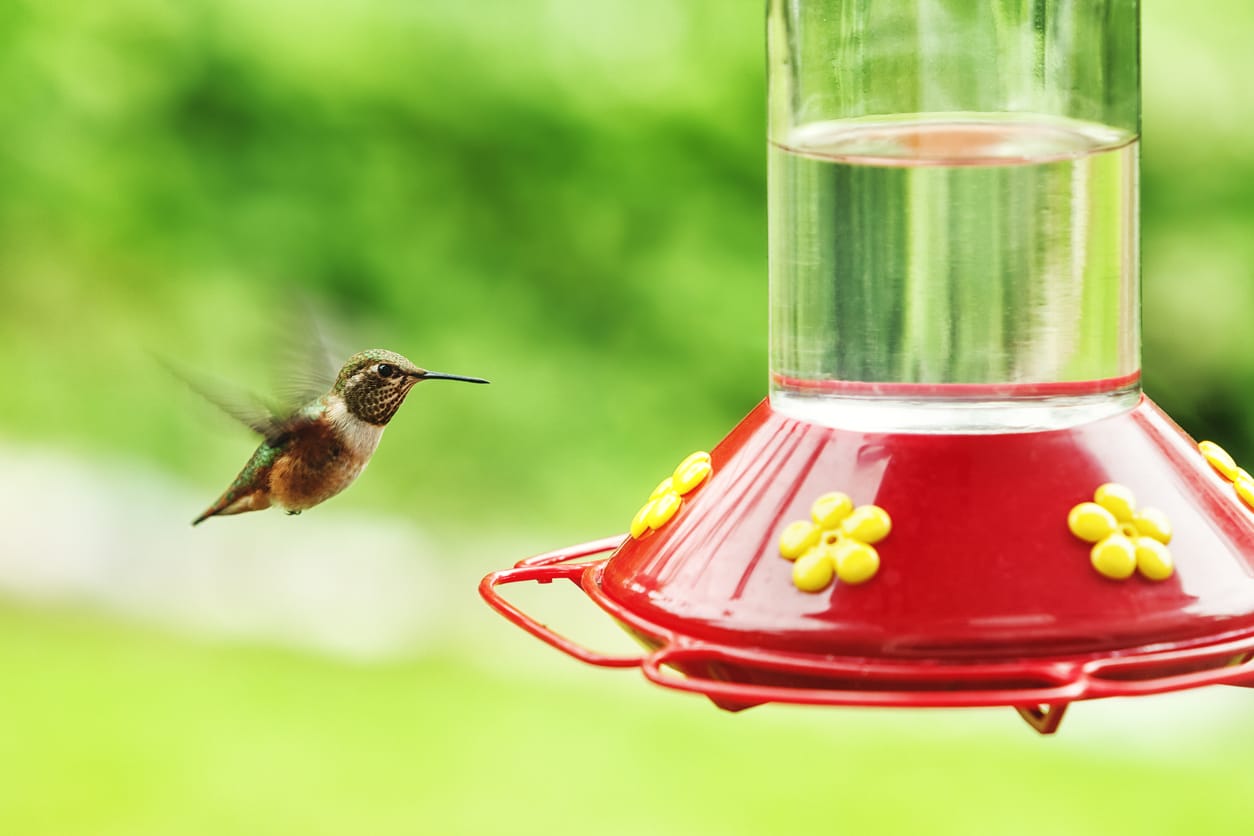
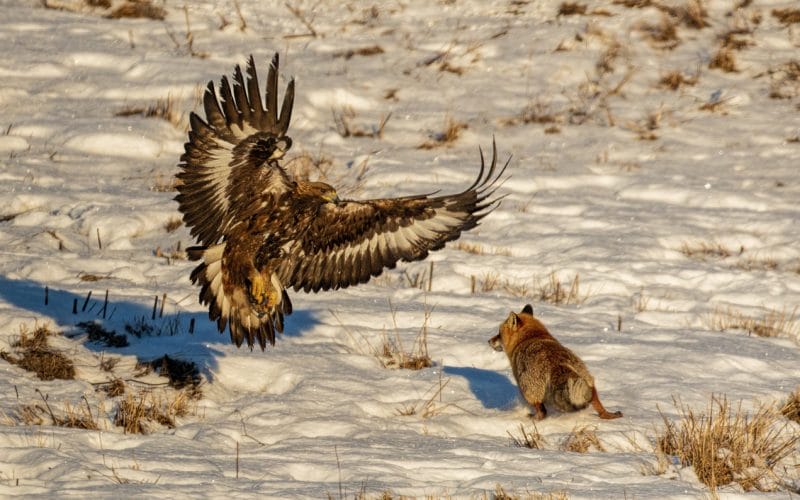
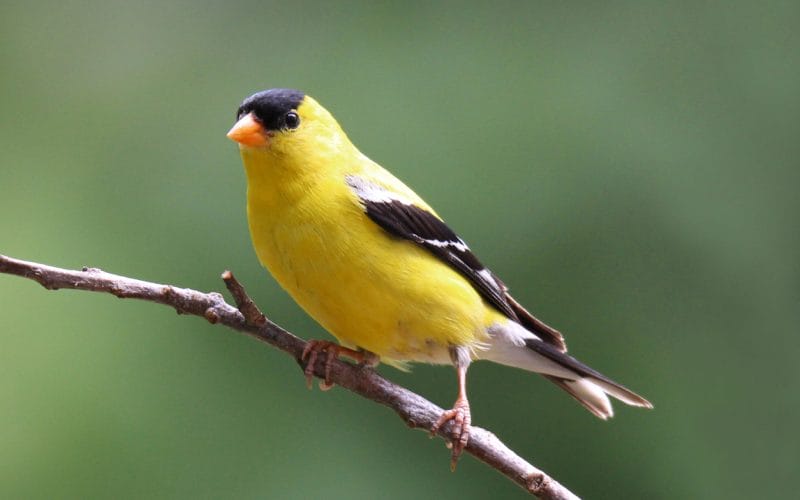
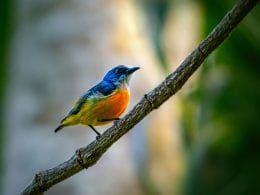
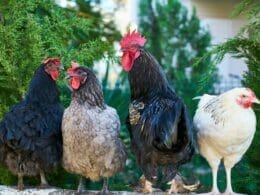
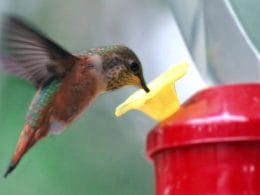
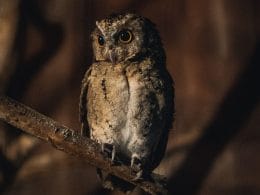
I have spent a lot of time to I get rid of the ants. It made me feel so sad to take down the feeder that they rely on and they looked so confused. I’ve made clean food and hung out the feeder after killing ants. I’ve seen one of my little buddies and hopefully I’ll see more. Trying to figure out how to not have that problem again. Maybe Vaseline?
Vicks was a great option! Semi-waterproof & works great! Thanks!
Vicks in a upside-down moat. Just a thin coating on the inside.